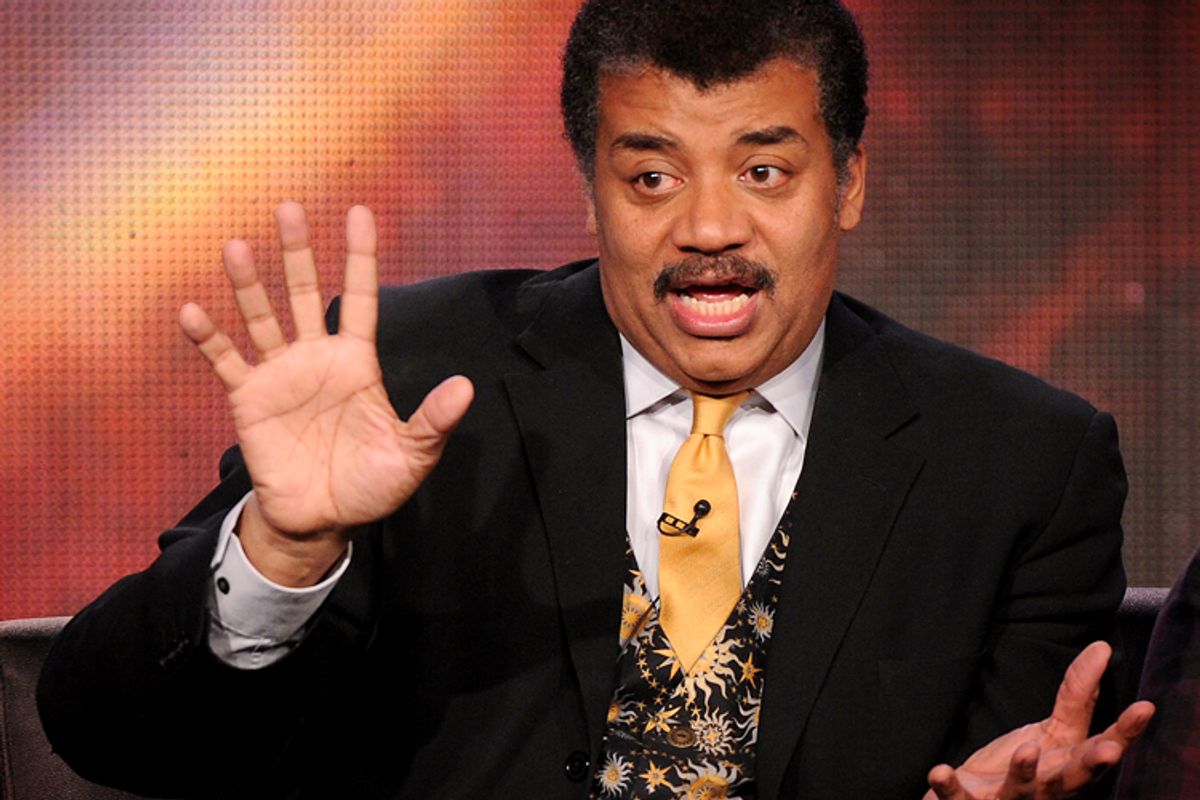 Creationists want religion out of Cosmos, unless of course it favors them. Each week Neil deGrasse Tyson has been attacked by creationists and the religious right for anything he says that makes religion look bad. In this week's episode about electricity, Tyson discussed a Christian scientist, brushing off the importance of religious belief while engaging in scientific inquiry. Naturally, creationists don't like that.
Creationists want religion out of Cosmos, unless of course it favors them. Each week Neil deGrasse Tyson has been attacked by creationists and the religious right for anything he says that makes religion look bad. In this week's episode about electricity, Tyson discussed a Christian scientist, brushing off the importance of religious belief while engaging in scientific inquiry. Naturally, creationists don't like that.
Michael Faraday was introduced this week to millions around the globe for his contributions to science, many of which benefit us all today in our everyday lives. Faraday was a devout Christian, and Tyson mentioned this, but as David Klinghoffer of the Discovery Institute points out:
“Faraday's faith is mentioned at the beginning but implicitly dismissed as having anything to do with his science. Cosmos shows us his impoverished family saying grace at the dinner table and explains that he 'took [their] fundamentalist Christian faith to heart. It would always remain a source of strength, comfort and humility for him.' That's it—nothing more than a warm blanket on a cold night.”
Tyson is not lying or misrepresenting Faraday here. Faraday was a great scientist who knew how to check his faith at the lab door and study the actual data in front of him.
This upset Klinghoffer to no end. He goes as far as to mention his 12-year-old son, a fan ofCosmos, who is not allowed to watch any episode because of the content. You have to love the open mindedness of raising your kid to only believe what you believe.
Klinghoffer quotes MIT professor Ian H. Hutchinson:
“One example of the influence of [Faraday's] theological perspective on his science is Faraday's preoccupation with nature's laws. 'God has been pleased to work in his material creation by laws,' he remarked, and 'the Creator governs his material works by definite laws resulting from the forces impressed on matter.'”
While this is correct, how would Tyson benefit the viewer by pointing this out? Faraday’s discoveries would not change based on his belief or the validity of his personal faith. Faraday calls them nature’s laws; he just happens to believe a God created them.
Klinghoffer continues:
“Tyson has gone out of his way, indeed twisting the facts, to depict faith as an obstacle to science. But when acknowledging its vital role in scientific history would be most appropriate, Cosmos invariably falls silent.”
It is Klinghoffer who twisted the facts, trying to make his readers believe that all of Faraday’s discoveries were based on his faith and not his devotion to the scientific method.
Tyson and the writers at Cosmos are not in some anti-religion conspiracy. They are simply delivering a dialogue about the world we live in. Creationists demand validity when none should be afforded to them.
A scientist like Faraday can exist today and indeed does. Scientists around the world hold their own religious views. The ones who are successful at science are the ones who are able to check their faith at the door and can work in the lab using the scientific method, not fairy tales.
Tyson has brought up religion a handful of times, to counter its stance against evolution, call out the claims that earthquakes are caused by moral issues, and remind everyone that in the past the church has gone so far as to kill those who used science to speak out against the Bible. However, Tyson and the writers at Cosmos have not made it a point to mention every scientist’s religious beliefs if they had no impact on the story at hand.
The Discovery Institute is simply embarrassed, as it was weeks before when its worldview was deconstructed on national television. In retort it stoops to ad hominem attacks of Tyson, MacFarlane and the writing team at Cosmos, who are telling a beautiful lesson week after week.
Organizations such as the Discovery Institute highlight why there is such a divide between religion and science. The fact that they take offense at a scientist having religious beliefs that do not influence his discoveries in the lab shows once again that truth is not their goal.
As in weeks past, when the data invalidate the claims, the next best response is to attack Tyson. And just as in weeks past, science prevails when it simply produces verifiable data over ancient myths.

Shares